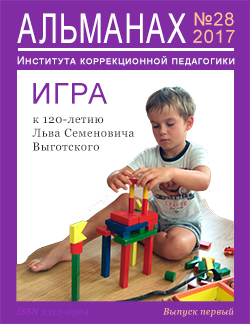Play. On the Occassion of the 120th Birthday Anniversary of L.S. Vygotsky
Almanac #28 · · 2017

Play and its Role in the Psychical Development of the Child
Keywords
Play and its Role in the Psychical Development of the Child
Cultural and historical theorygenesis of the play
role of play in development
psychical development
methodology of play psychology
leading activity
zone of proximal development
Play and Psychical Development
Keywords
Play and Psychical Development
Playpsychical development
formation of children's play
ontogenesis of the psychics
cultural and historical special pedagogy
The Role of Play in Special Correctional Work on Disorders of the Autistic Spectrum
Keywords
The Role of Play in Special Correctional Work on Disorders of the Autistic Spectrum
Children's autismplaying lessons
movement from autostimulation to a mutual experience
emotional and semantic comment
understanding of everyday events
Pre-School Education: a Program Based on the Method of Playing Therapy
Keywords
Pre-School Education: a Program Based on the Method of Playing Therapy
Playing lessonsdevelopment of emotional and meaningful sphere
direct interaction
play event
independence
play initiative
The Development of Playing Interaction of Preschool Children with Autism Spectrum Disorders Using the Method of "Playing in the ring "
Keywords
The Development of Playing Interaction of Preschool Children with Autism Spectrum Disorders Using the Method of "Playing in the ring "
Children with Autism Spectrum Disordersplaying interaction
communication disorders correction
playing in the ring
Interaction between the Mother and the Blind Infant: Pleasure of Playing Together
Keywords
Interaction between the Mother and the Blind Infant: Pleasure of Playing Together
Early aidblind infants
direct-emotional communication
mother's play with a child
Play of an Adult and a Young Child with Down Syndrome: Development of Activity in Interaction
Keywords
Play of an Adult and a Young Child with Down Syndrome: Development of Activity in Interaction
Early aidDown syndrome
young child
mother and child play
mother and child communication
need for communication
mother and child interaction establishment
Childhood Today - in the Science and in the Life
Keywords
Childhood Today - in the Science and in the Life
Childhood in culturethe concept of age
family
children's play
cultural and personal values
The Child's Play in the Context of Culture Reverting to Childlike State. Opinion of a Special Psychologist
Keywords
The Child's Play in the Context of Culture Reverting to Childlike State. Opinion of a Special Psychologist
Play as a tool for special correctional care in autismconvergence of plays of children with autism and the play of ordinary modern children
childhood in the culture of postmodernity
aging of modern culture
disbalance in the system of cultural and personal values
What is Play?
Keywords
What is Play?
Criterion of the playimaginary (pretended) situation
"in a way"
"as if"
psychology of the play
cultural and historical theory of L. S. Vygotsky
play and training
formation and development of the play
child’s imagination
psychological readiness for school
The Appearance of the Elements of the Symbolic Play
Keywords
The Appearance of the Elements of the Symbolic Play
Playlongitudinal observation
symbolic play
general development of the child
phenomenology of play development
Playing therapy
Keywords
Playing therapy
Playplaying psychotherapy
playing therapy
child psychoanalysis
behavioral approach